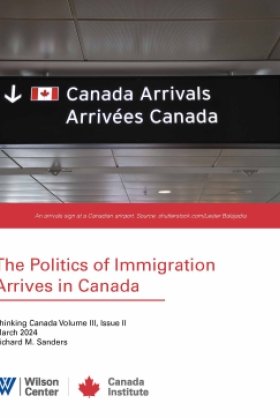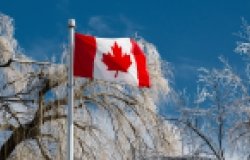Arctic Geopolitics and Canada: An Interview with Joël Plouffe
Interest in the Arctic is surging as thawing sea ice has opened the possibility of new sea routes and access to supposedly gigantic amounts of natural resources in the region. But with opportunities also come diplomatic challenges, and Canada has both. To explore them, the Canada Institute's Public Policy Scholar Jean-Frédéric Légaré-Tremblay spoke with Joël Plouffe*, a Montréal based Canadian specialist on Arctic affairs.
Jean-Frédéric Légaré-Tremblay: Arctic states like Russia, Norway, Finland, and even Iceland have recently released foreign policy strategies to address many emerging geopolitical challenges due to global warming and thawing sea ice in the Arctic. What is Canada's approach to the Arctic?
Joël Plouffe: I would say that Canada is in continuity with its traditional regional approach that is based on promoting cooperation, good international governance, environmental protection, prosperity, and, mostly, Canadian territoriality in the circumpolar world.
In fact, last August, Foreign Affairs Minister Lawrence Canon released a Statement on Canada's Foreign Policy for the Arctic that highlights in a 30 page document every possible relevant policy decision Canada has put forward and supported in that region with its allies during the last 30 years, especially the United States. From that perspective, this policy statement acknowledges that Ottawa will continue to further and strengthen cooperation among all of the circumpolar neighbors. These are close partners that Ottawa has been working with very closely in the region through the Arctic Council and elsewhere since the end of the 1980s -- on various key security issues such as environmental protection, shipping, climate change, and search and rescue.
Outside the Arctic Council, Canada, the United States, and Denmark have furthered their trilateral Arctic military cooperation in exercises last summer. The three NATO allies performed joint naval exercises in the Canadian Arctic Archipelago to advance military interoperability to prepare for any type of emergency. This sense of preparedness for common conventional or non-traditional security risks seems to be guiding all foreign policies in the Arctic.
JFLT: But on the other hand, hasn't Prime Minister Stephen Harper warned of possible instability in the Arctic?
Joël Plouffe: Stephen Harper has warned of instability based on a very nationalistic discourse that bolsters Canada's Arctic identity and creates a somber image of what Arctic geopolitics are all about, keeping in mind Canada's close relations with its allies in the region. This rhetoric could potentially undermine Canada's international credibility or even isolate Canadians from a rapidly evolving globalized Arctic region. There is a clear contradiction between the prime minister's discourse and the established foreign policy statement released in 2010 that precisely states that Canada does not anticipate any military challenges in the Arctic where relations are very well managed, and thus stable. Therefore, Stephen Harper has acknowledged the importance of Arctic geopolitics for Canadians in such an ambiguous way that his discourse often inaccurately and pointlessly shifts attention to potential security threats to Canada's sovereignty over its internationally recognized waters and islands in the Arctic.
JFLT: Much of the surge of interest in the Arctic today is due to increased access to untapped resources like oil, gas, and minerals in the Far North. How would you describe what some international observers have called the new Arctic rush?
JP: … a catchy exaggeration that poorly reflects reality and rather fits some interests of those who tend to sell an interpretation of Arctic geopolitics instead of explaining them to the world. Wording things in such simplified ways shifts attention from the region itself, from its peoples' day to day preoccupations and pressing issues, and results in putting focus on southern preoccupations when dealing with thawing ice.
 What we see today in the Arctic are emerging security concerns for all circumpolar states and their willingness to reinforce effective and sustainable regional co-operation and governance. Thawing sea ice in the summer is forcing these states to look at the Arctic in an unprecedented way. Some Arctic neighborhoods like the North American Arctic or the Barents Sea region are at a crossroads where possible increased local/regional human activities will mean unprecedented and costly investments for new or enhanced infrastructure and collaboration.
What we see today in the Arctic are emerging security concerns for all circumpolar states and their willingness to reinforce effective and sustainable regional co-operation and governance. Thawing sea ice in the summer is forcing these states to look at the Arctic in an unprecedented way. Some Arctic neighborhoods like the North American Arctic or the Barents Sea region are at a crossroads where possible increased local/regional human activities will mean unprecedented and costly investments for new or enhanced infrastructure and collaboration.
This also means that the Arctic is becoming more globalized than ever, opened to outside legitimate interests. This relationship is an evolving rapprochement that is reinforced by thawing sea ice and greater access to some key strategic economic hotspots like the Barents Sea. In that scenario, since some non-Arctic states such as France, the UK, or Germany, for example, are more vocal than ever on their various interests in Arctic affairs. The Arctic Council will need to deal with increased dialogue between Arctic states and non-neighboring powerful allies. There is of course a need for a better understanding of globalization, many national and legitimate national interests, and the changing circumpolar world. These are issues that Canada has yet to figure out and must still address urgently.
JFLT: Canada and the United States have many disagreements in the Arctic, notably on the Beaufort Sea border and the legal status of the Northwest Passage. Is there room for collaboration between Ottawa and Washington in the Arctic?
JP: I think it's always risky to narrowly look at Canada-U.S. relations in one unique region like the North American Arctic and take that dynamic out of two fundamental contexts: the bilateral relationship between these two allies, and U.S. foreign policy objectives. Canada and U.S. relations are as strong as ever. This is reflected by policy actions that have resulted in even more integrated collaboration between both nations in the Beaufort Sea and the Canadian Archipelago. In fact, both countries recognized during the Second World War that working together for defense purposes in the Arctic was consistent with both national interests and continental security. This has not changed and still shapes their bilateral relationship, even if some differences exist and will again emerge in the Arctic, as they do elsewhere on other issues between both of these economically and militarily integrated nations.
My field observations tell me that the Canada-U.S. Arctic relationship is evolving as it should through common pragmatism. As with elsewhere in the region, allies have recognized the importance of dealing with common security risks in a collaborative way. This has allowed Russia and Norway to settle a 40 year border dispute in the Barents Sea last summer. In 2010, Canadians and Americans met in Washington, D.C., to discuss their border dispute in the Beaufort Sea. Canada has made this a high priority for its foreign policy agenda and the United States has engaged Canada in an unprecedented way to discuss this issue seriously. And for three consecutive years since 2008, both the Canadian and U.S Coast Guards collaborated on joint mapping expeditions in the Beaufort Sea to produce and share information on the North American Arctic's extended continental shelf. Defense cooperation is also being reinforced.
 *Joël Plouffe is a research fellow at the Raoul Dandurand Chair of Strategic and Diplomatic Studies and a Ph.D. candidate at the Universite du Québec à Montréal. He is currently a visiting scholar at the Friedrich Ebert Stiftung in Brussels and Berlin and will be conducting oil and gas research this month with international experts at the Bodø Graduate School of Business in Norway's High North.
*Joël Plouffe is a research fellow at the Raoul Dandurand Chair of Strategic and Diplomatic Studies and a Ph.D. candidate at the Universite du Québec à Montréal. He is currently a visiting scholar at the Friedrich Ebert Stiftung in Brussels and Berlin and will be conducting oil and gas research this month with international experts at the Bodø Graduate School of Business in Norway's High North.
Related Program

Canada Institute
The mission of the Wilson Center's Canada Institute is to raise the level of knowledge of Canada in the United States, particularly within the Washington, DC policy community. Research projects, initiatives, podcasts, and publications cover contemporary Canada, US-Canadian relations, North American political economy, and Canada's global role as it intersects with US national interests. Read more










